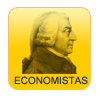William Graham Sumner, 1840-1910
Economista americano y darwinista social. Sumner piensa que en las sociedades humanas los individuos compiten entre sÃ; los que triunfan y alcanzan posiciones de poder, han sido seleccionados en esa lucha por ser los más eficaces, y ello se traduce en un aumento de la eficiencia global de la sociedad.

Estas fueron sus palabras:
"Las diferencias de clase resultan simplemente de los distintos grados de éxito con que los hombres aprovechan las oportunidades que se les ofrecen. En vez de esforzarse por redistribuir las adquisiciones hechas entre las clases existentes, nuestro objetivo debe ser aumentar, extender y multiplicar las oportunidades. (Subrayado en el original) (...) Esta expansión no es una garantÃa de igualdad. Por el contrario, si hay libertad, algunos aprovecharán las oportunidades con entusiasmo y otros las desaprovecharán. Por tanto, cuanto mayores sean las oportunidades, más desigual será la fortuna entre estas dos clases de hombres. Asà debe ser con toda justicia y toda razón. (...) Si ampliamos las oportunidades aseguramos el crecimiento general y constante de la civilización y el progreso de la sociedad por medio y a través de sus miembros mejores. (Sumner, What Social Classes Owe to Each Other?, Caldwell, Ohio: Caxton 1883, 1952).
Obras
"The Causes of the Farmer's Discontent," 1873, Nation
History of American Currency: with chapters on the English bank restriction and Austrian paper money : to which is appended "The bullion report", 1874
"Monetary Development", 1875, Harper's
"Politics in America, 1776 - 1876", 1876, NAR
Lectures on the History of Protection in the United States, 1877
"What Our Boys are Reading", 1878, Scribner's
"The National Bank Circulation", 1878, Scribner's
"Professor Walker on Bi-Metallism,", 1878, Nation
"Socialism", 1878, Scribner's
"The Commercial Crisis of 1837", 1879 Scribner's
"Bimetallism", 1879, Princeton Review
"The Theory and Practice of Elections", 1880, Princeton Review
"The Argument Against Protective Tariffs", 1881, Princeton Review
"Shall Americans Own Ships?", 1881,
"Sociology", 1881, Princeton Review
"Wages", 1882, Princeton Review
Andrew Jackson as a Public Man, 1882
"Protective Taxes and Wages", 1883, NAR
"The Absurd Effort to Make the World Over", 1883 (extracts)
What Social Classes Owe to Each Other, 1883. (extract)
"The Survival of the Fittest", 1884, Index
"Sociological Fallacies", 1884, NAR
"Evils of the Tariff System", with D.A. Wells, T.G. Shearman, J.B. Sargent, 1884, NAR
"Shall Silver be Demonetizied?", 1885, NAR
Collected Essays in Political and Social Science, 1885
"Mr. Blaine on the Tariff", 1886, NAR
"State Interference", 1887, NAR
Protectionism: the -ism which teaches that waste makes wealth, 1887.
Alexander Hamilton, 1890
The Financier & the finances of the American Revolution, 1891
A History of Banking in all the leading nations, 1896
"On Empire and the Philippines", 1898 (extract)
"The Conquest of the United States by Spain", 1899, Yale Law Journal (copy)
Folkways: a study of the sociological importance of usages, manners, customs, mores, and morals, 1906
War and Other Essays, 1911
Earth-hunger and other essays, 1913
The Challenge of Facts and Other Essays, 1914 (extract, extract)
"The Forgotten Man", 1916?
The Forgotten Man, and Other Essays, 1917
Science of Society, with A.G. Keller, 1927.



| En eumed.net: |
 1647 - Investigaciones socioambientales, educativas y humanísticas para el medio rural Por: Miguel Ángel Sámano Rentería y Ramón Rivera Espinosa. (Coordinadores) Este libro es producto del trabajo desarrollado por un grupo interdisciplinario de investigadores integrantes del Instituto de Investigaciones Socioambientales, Educativas y Humanísticas para el Medio Rural (IISEHMER). Libro gratis |
15 al 28 de febrero |
|
| Desafíos de las empresas del siglo XXI | |
15 al 29 de marzo |
|
| La Educación en el siglo XXI | |




